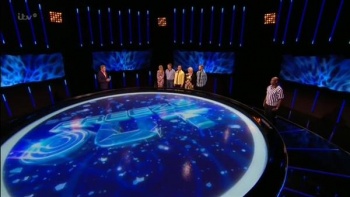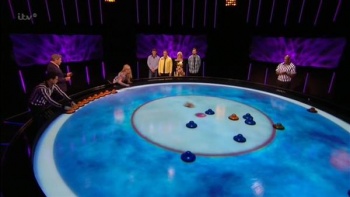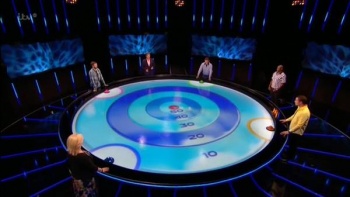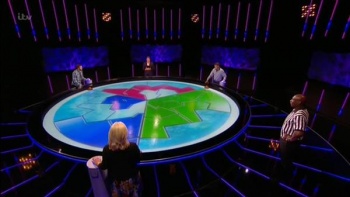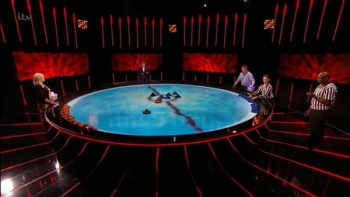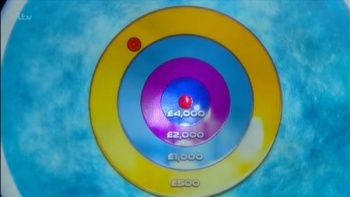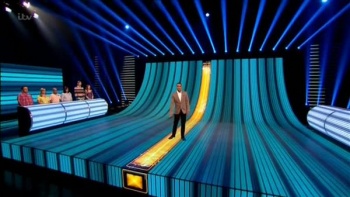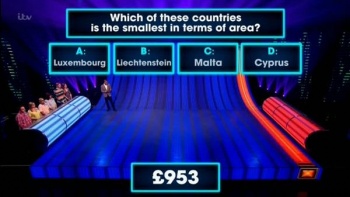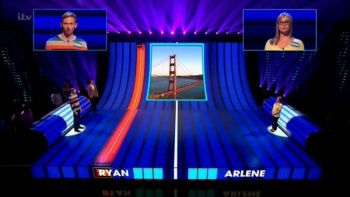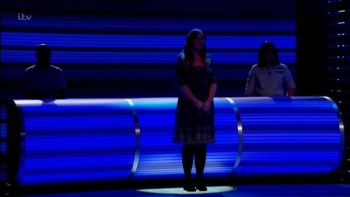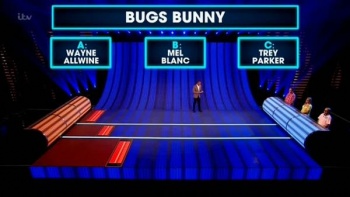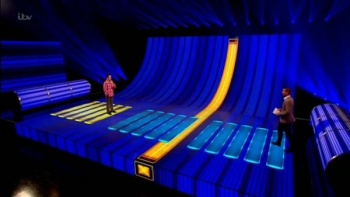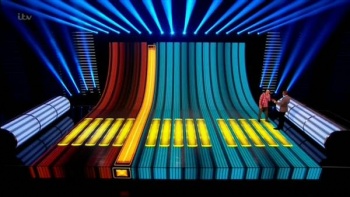Weaver's Week 2015-08-30
Last week | Weaver's Week Index | Next week
Every August, ITV puts out one or two game shows at 5pm. We're not entirely sure why they do this. It could be to spin out The Chase so that 250 episodes last two years. It could be to make us appreciate the Following Five by their absence. It could be to find the new Tipping Point, the only show from these summer experiments to have been picked up.
There have been other good shows – we enjoyed Don't Blow the Inheritance (2012) and The 21st Question (2014), some folk appreciated Gift Wrapped (2014), but we can't find anyone with a good word to say about Take on the Twisters (2013). What of this summer's trialists? Will any make the ITV A-team? And would it have helped if there had actually been a summer?
Contents |
Freeze Out
Talkback for ITV, 3-14 August
Mark Durden-Smith hosted the first programme. "It's a brand new sport!" gushed the press release. Freeze Out takes place on a massive ice table, and combines precision shooting with general knowledge.
Skill and quiz are two concepts that haven't traditionally worked. Yes, there was Big Break, but the snooker show had a clear divide between the amateur knower and the professional player. Bullseye, that also split the knower from the thrower. But can we think of a successful quiz-and-action combo? Not really.
And games played on ice have a tradition of going badly wrong. Ice Warriors (1998) is the classic example: they tried to do Gladiators on skates, but ran into many problems. The casting was wrong, the host was out of her depth, there was an irritating and pointless comedy character, and there aren't many things you can do on ice: go fast, leap over things, and stop on a sixpence.
Freeze Out didn't have all of these problems. Mark Durden-Smith proved to be a competent and capable host, in a way that Dani Behr didn't.
Five contestants played the opening round, "Smash Out". For this round, seven blue targets were put in the middle of a circle on the ice table. The targets – "sliders", in Freeze Out lingo – were lightweight plastic disks with a knob on top, they would move quickly across the ice if struck or thrown, but would slow down through friction. Players could use a limitless supply of orange sliders to strike the blue targets. The rules allowed for one orange slider to be released for each correct answer. The round would end when all seven blue sliders had cleared the playing circle, or when 90 seconds expired.
So we have a fast-moving opening round, we meet all five players, hear lots of questions, and see some smashing action. Someone has to leave at the end of the round.
"Centre Slide" followed the commercial break. The four remaining contestants each have one slider, and they're asked to get it as close as possible to the centre. But players can target each other's sliders, and move them like in a game of curling. After each player has thrown their slider, they're asked a question. Get it right, and they score the points from where the centre of the slider has come to rest. Get it wrong, and there's no score. Then repeat so that all four contestants start (and hence all four get the hammer to end the round).
This round dragged on a little, sixteen shots and sixteen questions – even when it was clear who had lost the round, they played on and asked the remaining questions.
Round three was "Ice breaker". Players were asked questions on the buzzers: a right answer allowed that player to launch one of their own sliders, a wrong answer let the other two release their sliders. The objective was to land a slider on each of eight irregular areas. Sliders that straddled two or three areas would clear all of those "shards", and a slider could clear ice for any player, not just whoever threw it.
For our money, this was the best round: knowledge and tactics and skill combine for an entertaining few minutes.
Into the final part of the programme, and "Face off". More questions on the buzzer, and each correct answer (or error by the opponent) allows a player to fire one slider into play. The winner will be whoever has most sliders in a small centre circle after two minutes of play.
There was no clock on screen here, so we viewers were in the same boat as the contestants – we didn't know how much longer there was to play. That added to the tension, and made for a more compelling end game.
The winner goes through to play the final. A minute of questions, each right answer earns a slider. Fire these sliders at rings marked on the ice table: £500, then £1000, £2000, £4000, and a centre button worth £10,000. The slider must land entirely in a single ring to win its value. Should the player win £1000, that prize is safe: otherwise, the winner decides whether to play on or take the cash. Winning sliders are returned, so the minute of questions is to build up failures in the prize round.
The problem here was the small centre "ring", which appeared to be about the same size as one of the sliders. No-one gambled for £10,000, and few players did well enough to think about going for £4000.
Throughout the game, there are some close calls. Is the slider on the line, or is it crossing the line? Where's the centre of this slider positioned? If there's no clock on screen, who is keeping time for the players? The answer to all these questions is provided by Uriah Rennie: the retired football referee is a trustworthy person for these decisions.
But he's not a comedy foil for Mark Durden-Smith. Freeze Out tried to build Mr. Rennie into an "ice judge", who would ignore Mr. Durden-Smith and his not-very-funny jokes. Between them, the pair tried to be comedy, but they were less successful than Schnapps and the Ice Master.
Our friends at Bother's Bar came up with a new motto this summer: "people don't watch formats, they watch shows". There is the game, and there is the show. The format of Freeze Out – the basic idea of the game – has some merit. The ice sport of curling has a certain popularity – especially when the British are doing well at it. There's a primal satisfaction about throwing a stone as hard as you can at a clump of pebbles and seeing them scatter in all directions. There might only be two things to do on ice, but Freeze Out never felt like it was repeated itself within an episode.
But the show leaves us unsatisfied. The quiz is undemanding: the questions are predictable and lack inspiration. Mark Durden-Smith is a competent and capable host, and Uriah Rennie a valuable judge, but their interaction was forced and wasn't funny. The endgame proved impossible to win, so every programme ended on something of a downbeat note.
For everything right with the game, there was something wrong with the show. A shame.
Rebound
Thames for ITV, 17-28 August
Over to the more respectable side of Fremantle for this second programme. Sean Fletcher is the host, he's the sports presenter on ITV Breakfast Broadcasting's show Good Morning Britain.
The central conceit is the "rebound bar", a stripe moving across a massive LCD display on the studio floor. This summer's programmes have splashed out on some impressive props, and this one dominates the studio. The back wall towers above Sean and the players, and it stretches some distance out. At each end, the edges are hidden by desks, concealing buttons.
For the first round, six players have assembled. All play in the first round, "Fast cash". Three general knowledge questions are asked, with four possible answers. Sean asks the questions while the bar is heading away from the players, and the answers appear while it's rebounding back to them.
Whoever can select the right answer will win money: the amount depends on how long it takes to answer the question. A potential £1000 is possible for an answer in zero seconds, but the money falls to nothing in just ten seconds. With timing done to the hundredth of a second, players can win precise amounts of money – £641 is a reasonable result for one question.
Before giving each answer, Sean banters with the players – "why did you select this? What about that?" We see that the players have been picked for their outgoing nature, they'll engage with Sean, argue with him a little, make jokes at their own expense.
Just three questions in this round, so it's over before we get the chance to be bored.
Whoever's got the most money from the first round plays first in the "Head to Head" round. They're also able to pick their opponent. Will they pick someone with no money, in the hope that error will follow error? Might they choose someone just behind, to build a strong position later in the game? The decisions are many.
And they don't end with the opponent. The winner chooses one of two categories – for instance, "European flags" or "World landmarks". Something will be shown to each player in turn, and their job is to identify it. The "something" might be a picture of a famous landmark. It might be an anagram of a fruit, or an author's name with a word missing, or even some basic maths.
The players stand at opposite ends of the video floor, and bat the bar between them. The first player to make an error, or who fails to respond in time, will lose that category. Whoever loses three categories will lose their place in the game, and will hand over all their money to their opponent.
So far, so simple? Perhaps not. There's an added complication: the players are only allowed to respond when the bar is in their half of the floor. This is a very short time – perhaps five seconds when the round starts, little more than two seconds later on. But the questions get harder. Can players identify the flag and say "Croatia" on a reflex? The idea is familiar – they did something similar on Pressure Pad – but this particular rule feels more trouble than it's worth.
After a winner's been found from the first pair, that player stands behind the other desk. The loser is dismissed into shadow with a curt "you've been beaten by the bar". Sean delivers his line well, but it doesn't quite square with the cheery personality he used a moment before.
The highest-scoring player remaining from Fast Cash picks their opponent, and the next pair perform, and the final pair are also reduced to a single player.
Half way through, and three players remain in the game. A second round of "Fast Cash" allows the players to add more money to their banks – this time, five questions are asked, again with four answers. The player with most money takes an advantage into "Stop the Bar".
This fourth round is a three-way time game. The player in the lead gets the full length of the bar – about 30 seconds. Whoever's in second place has a three-second penalty, and the player in third gets a six-second handicap. Could they make this based on performance? Possibly, but try explaining it to the viewer. "Charles is in last place, £1663 behind Alice. Because he's last, he gets a six-second handicap, which works out at £277 a second. Bill is £592 behind Alice, so his handicap is 2.14 seconds." It's not worth the confusion!
In this round, the contestants see three options, and their bar starts as soon as they see the clue. Only one of the options meets the clue, and the players are asked to find that option. Their personal bar will stop as soon as they lock in, but an incorrect answer will cost two seconds from their clock. Players are out as soon as their bar rebounds to them, and the last player standing wins.
On paper, this is meant to be a nail-biting finale, enhanced by an ad break after the first player is eliminated. In practice, it tends to be a foregone conclusion – once a player falls well behind with just a moment on their clock, they're relying on the other player making an error. Rather than penalise players, perhaps they might award bonus time for a correct answer – split 1.5 seconds between everyone who got it right.
The daily winner takes on "Beat the Bar" for everyone's cash. Here, the winner picks a category from six options, and is then asked some questions. A correct answer allows them to advance along the floor. After five correct answers, the player will stop. So will the bar, which started at the opposite end and has been advancing towards them at a constant rate.
The player chooses a second category for the next round, and the questioning resumes. So does the bar. After five correct answers, player and bar stop, and a third category is picked. Eventually, the bar will reach the end, and will rebound towards the player, hoping to catch them from behind. Can the player outrun the bar? Will they give fifteen correct answers and reach safety, or will the bar crush them from behind?
This is an outstanding final game, tense and swift, victory and defeat are always in the player's grasp. A pursuit to remain alive is familiar from The Chase, except here the player actually moves along a real playing surface. There's plenty of show in this game show, and it ends with a fabulous final round.
We do have a slight problem with some of the game decisions. "Head to Head", for instance, doesn't need to have the rule where players can only answer when the bar's in their half. It doesn't need to have the bar speed up and the questions get harder. Any one of these rules is fine; all three make the round messy.
There's also a mess at the end: whether the player's won or lost, Sean has to verbally give the right answers to questions the player got wrong. Slightly detracts from a win, and drags out the moment of defeat. They might prefer to put the right answers up on screen, like they do on Win Your Wish List.
From some of the questions, it's clear that Rebound has been recorded close to transmission. Perhaps the programme was under-rehearsed, we reckon Sean's hosting improved in later episodes to be recorded. This isn't a personal criticism, it takes a lot of experience to be as slick as Mark Durden-Smith, and not everyone wants to be that slick.
We appreciated some of the finer points in the format. The only way to win money is in the "Fast Cash" round (why they didn't call it the "Cash Bar", we may never know). With each correct answer worth about £600, order is determined more by the number of correct answers, with the time taken as a tie-break. All the money goes into one communal pot. The only straightforward question-and-answer comes in the final round.
The main thing is that Rebound works as a show. Unlike every other summer programme of the past three years, it's held up well against the Pointless repeats, and ITV would be sensible to make a longer run in the new year.
This Week and Next
The Edinburgh International Television Festival took place this week. The magic news: Penn & Teller: Fool Us will be returning to British television screens. The show had a short run on ITV in 2011, has been remade for The CW network in Yankeeland, and will now be re-exported back to the UK to air on Channel 5.
In other news, ITV released its The X Factor schedule, hoping to avoid clashes against Strictly Come Dancing. Not having any live shows before the end of October might help; not having any credibility might assist the audience to pick a talent show..... The final's on 12 and 13 December..... Armando Iannucci attacked the government..... BBC publish a report into what happens when people can't use the BBC..... BBC4 is to hold a "Britain's Best Amateur Band" contest, doubtless to be won by Oasis.....
We have a final list for Strictly. Add to last week: Anita Rani (Radio 5 host), Jamelia (I Love My Country host), Helen George (I Love My Country panellist), and Jay McGuiness (us neither). The set was completed by Kirsty Gallacher (All Star Cup host) and Iwan Thomas (400m runner) (400m runner). The last is not to be confused with someone more familiar to this column, Iwan Thomas (Brain of Britain).
And a Second Bite correction: Anthony Ogogo is the second (not the first) Big Brother contestant to enter the Glitterball Arena. How could we forget Alison Hammond's performance last year?
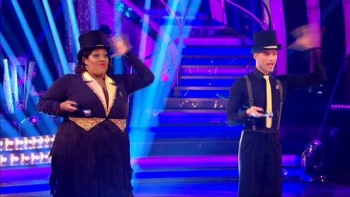 We even reviewed the show with Alison on it.
We even reviewed the show with Alison on it.
The X Factor returned, and promised us an exciting new twist. While we wait to find out what that is, they also said that "viewers" would "decide" which category each judge gets. It appears we're not allowed to suggest accurate names for categories, such as "People Only Included Because They've Got Sob Stories" and "Groups That Aren't Going To Be The New One Direction".
"Celebrity" Big Brother returned, followed within 24 hours by an ejection. One of the lab rats had published articles in praise of Hitler. The show's producers didn't spot this fact until it was pointed out to them by many viewers – evidently they trust That Other Wiki even less than we do. Having established the facts, and checked with Channel 5 bosses, they determined that the lab rat's position was "untenable" and the rat had to be removed.
Quiz update
A Breakfast Time special on University Challenge, it was God's Building against The New Dish. Christ's Cambridge (Vivek Midha, Joe Kitchen, Douglas Morton, Evan Lynch) took on Kellogg Oxford (Jake McBride, Victoria Ball, Jonathan Finlay, Simon Dismore). Kellogg's making its debut: the college is about 25 years old, a postgraduate college funded by a charity linked to the cereal company.
"There's plenty of time," said the host half-way through. He thinks he's in training for The Crystal Maze later this year, except it won't be opening until 2016. On this show, "There's plenty of time" is code for "Switch off now, it's game over": Christ's wins by 205-60. The highlight? We have another new exclamation: "Christ's Kitchen!"
A closer match on Only Connect. It had to be, as it's Countdown Octochamp o'clock. Road Trippers (Chris Pendleton, Nick Patterson, teapot-holder Ned Pendleton) took on Athenians (teapot-holder Jon Stitcher, Ben Holmes, Amber Marshall); the Athenians won by 25-18. It was a low-scoring start, both sides solved their walls easily, and Athenians won it on the Missing Vowels round.
Missing vowels was a theme earlier, a question asked after words that lost a vowel in Washington's country. Kelly – Kelly – Kennedy, the original Game for a Laugh cast had Beadle on the right. But our favourite question was four different definitions of the same concept, they don't visit the idea too often and it's all the better for the rarity.
To answer a number of questions: "Aquamarine Fang"? That's a colour-change from White Fang, by Jack London.
Ned Pendleton is something of a regular at the moment – as well as Only Connect, he's appearing in the current run of Hive Minds, and warmed up for that episode with an appearance on Two Tribes a few hours earlier. Carry on at this rate and he'll reach Katherine Ryan levels of ubiquity.
"You went for Betjeman too soon" was the calling on Hive Minds, where Trivium beat Aracarians by 27-8. The show was won in the second round, where Trivium knew their game birds while Aracarians got stuck on ancient empires. The scores diverged in the Superhives, where Best Pictures proved better than Poets Laureate.
Episode five of Mastermind was a tight match. David Horan won the game, he scored a Perfect 14 on Gerard Manley Hopkins, and did just enough in general knowledge to increase his score to 25 points and 4 passes. That was just enough to beat Andy Burrows; he'd made 25 with 5 passes, including one after the end of his general knowledge round. If only he'd said "Bulgaria", he'd be in a tie-break. Dave Lodwig is last on the high-scoring losers' list on 22 points and 2 passes, and Janet Parfitt faced questions she wasn't expecting.
BARB ratings in the week to 16 August.
- The Great British Bake Off continues to dominate all before it, with 11.6m viewers this week.
- Daily Pointless pulled 3.45m on Friday, enough to beat Dragons' Den (3.15m), University Challenge (2.9m) and Bake Off An Extra Slice (2.8m).
- ITV's leader was Keep It In the Family (3) (2.5m), with 2.15m for The Saturday Night Story and 1.95m for Flockstars. The latter was beaten by Catsdown (2.1m).
- Two Tribes and Eggheads both topped a million, Fifteen-to-One The Celebrity Edition 1.15m, which was level with Cilla at the BBC on BBC4.
- Hell's Kitchen topped the non-PSB games, 520,000 for this ITV2 import. 460,000 for Come Dine on More4, and 280,000 for Taskmaster on Dave.
Coming up: the return of The Chase (ITV weekdays), and new editions of Eggheads (BBC2 weekdays). Strictly Come Dancing has its première (Red Button, Wed; BBC1, Sat), and the BBC New Comedy Award returns (Radio 4 Extra, Fri).
Photo credits: Talkback, Thames, BBC.
To have Weaver's Week emailed to you on publication day, receive our exclusive TV roundup of the game shows in the week ahead, and chat to other ukgameshows.com readers, sign up to our Yahoo! Group.


